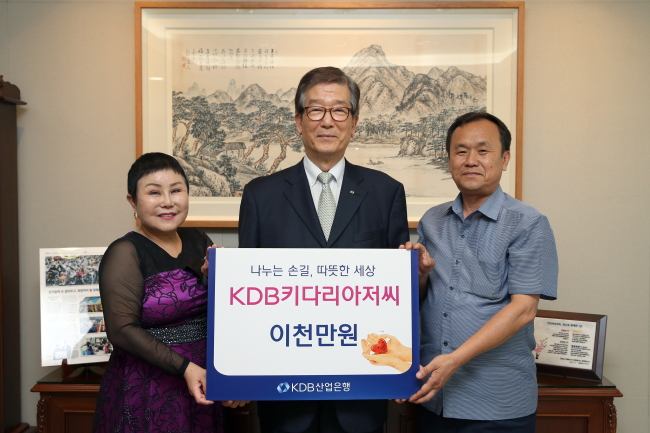The state-run Korea Development Bank offered financial support to a town in Gwangju that is home to Korean descendants who moved back here from post-Soviet states, according to officials.
KDB Chairman and Chief Executive Officer Lee Dong-geol on Tuesday delivered the 20 million won ($17,700) fund to a representative of the town’s residents, Shin Jo-ya, a 61-year-old ethnic Korean from Uzbekistan and descendant of an independence fighter during Japan’s colonial rule.
The money will be used for the residents’ daily necessities, college tuition fees and the construction of kindergarten facilities, according to the bank.
 |
Chairman and Chief Executive Officer of the Korea Development Bank Lee Dong-geol (center) presents the bank’s financial support to Shin Jo-ya (left), a representative of a town of ethnic Koreans from post-Soviet states, at the bank’s headquarters in Seoul on Tuesday. (Korea Development Bank) |
Since 2003, some 4,000 ethnic Koreans -- called “Kareiski” -- from countries such as Uzbekistan, Kyrgyzstan or Kazakhstan have come to live in the town.
Among them, fourth-generation Kareiski and their descendants are considered foreigners here. They are therefore excluded from government subsidies for education, health insurance and child rearing.
During the decadeslong Japanese occupation of the Korean Peninsula that began in 1910, many Koreans moved to various parts of the Soviet Union. In 1937, then-Soviet Union leader Joseph Stalin drove them out farther west to Central Asia.
The bank’s contribution marked the 20th of a series of financial support made under the theme of “KDB Daddy-Long-Legs.” Since 2016, the state-run bank has offered a total of 225 million won to disadvantaged groups and those in need of medical expenses.





![[Exclusive] Hyundai Mobis eyes closer ties with BYD](http://res.heraldm.com/phpwas/restmb_idxmake.php?idx=644&simg=/content/image/2024/11/25/20241125050044_0.jpg)
![[Herald Review] 'Gangnam B-Side' combines social realism with masterful suspense, performance](http://res.heraldm.com/phpwas/restmb_idxmake.php?idx=644&simg=/content/image/2024/11/25/20241125050072_0.jpg)

